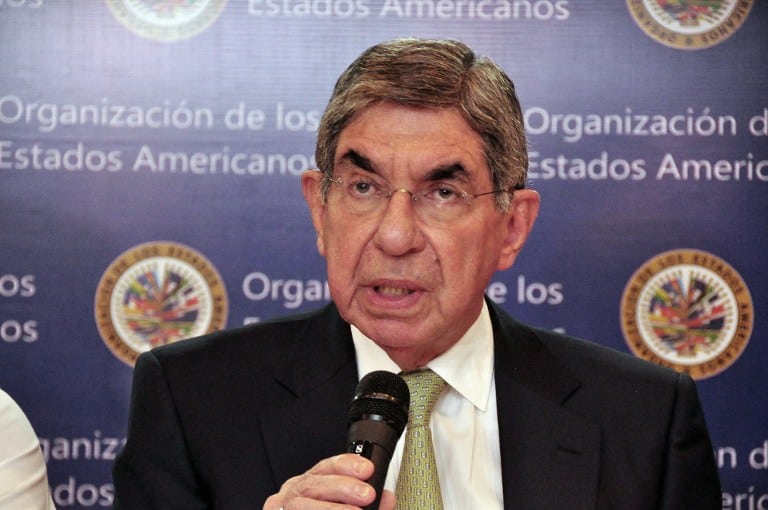In the face of violent protests roiling Venezuela, many of Latin America’s leaders have backed the government of President Nicolás Maduro, some have stayed mum and only a few have complained.
In fact, Costa Rica has been one of the most vocal countries speaking out against the alleged violence by the Maduro regime against anti-government protesters. The region’s few voices of dissent have been conservative leaders — Panama’s Ricardo Martinelli so angered Maduro that the leftist Venezuelan president broke off ties with Panama City — but by and large, those voices have been muted.
“The region has protected itself in the ‘democratic clothing’ of President Maduro, who was elected democratically,” Alberto Pfeifer, a University of São Paulo professor and specialist on the region, told AFP.
“That is the position of the Community of Latin American and Caribbean States, the Organization of American States, the Union of South American Nations and [regional trade bloc] Mercosur,” Pfeifer added.
Strong leftist support
Those quickest to back Maduro were Argentina, Bolivia, Cuba, Ecuador and Nicaragua — all countries with leftist governments whose heads of state were close with Maduro’s predecessor, the late Hugo Chávez.
Bolivian President Evo Morales and Cuba’s Raúl Castro even traveled to Caracas on Wednesday to mark the first anniversary of Chávez’s death
Carlos Malamud, a senior analyst for Latin America at Spain’s Elcano Royal Institute, told AFP that countries such as Argentina, Bolivia and Ecuador “cannot allow the elected government of Venezuela to fall” because they run “the risk of the same medicine being applied to them.”
The anti-government protests in Venezuela, over rampant crime and widespread shortages of basic goods, have so far left 20 people dead.
While the United States and the European Union have spoken out for the protection of freedom of expression, very few in Latin America have defended those principles.
“Only a few critical voices are being raised, timidly, in defense of human rights and freedom of expression,” Malamud said.
Malamud named Martinelli, Colombian President Juan Manuel Santos and Chile’s Sebastián Pinera as among those who have criticized authorities in Caracas.
Uruguay — while showing solidarity with Venezuela — has nevertheless defended the right to free expression.
Break with Panama
After Martinelli broke ranks and called for a meeting of the Organization of American States on Thursday to seek solutions to resolve tensions in Venezuela, Maduro struck back, breaking off ties.
“Nobody will conspire with impunity to ask for an intervention against our fatherland. Enough!” thundered Maduro, who regards the protests as a U.S.-backed plot to destabilize his government.
Pinera, who has enjoyed cordial relations with Caracas despite his ideological differences with Maduro, has called for respect for human rights in Venezuela.
His successor, leftist Michelle Bachelet, on Thursday pledged her support for “the government and people of Venezuela” as they seek a democratic, peaceful way out of the crisis, which erupted on Feb. 4 and has become the biggest challenge yet to Maduro’s nearly year-old government.
Colombia’s Santos has called for calm and dialogue with Venezuela, though Caracas has accused former president Álvaro Uribe of fueling the anti-government opposition.
She said Chile would support respect for human rights, but also would oppose “violent actions seeking to destabilize a democratically elected government.”
Silence from Brazil
Regional giant Brazil, whose traditional line is not to interfere in the internal affairs of neighbors, has so far only reiterated the line of tacit support for Maduro issued by Mercosur, which groups Argentina, Brazil, Paraguay, Uruguay and Venezuela.
Brazil “will, as far as it can, resist criticizing the situation, unless and until an escalation of the violence makes that impossible,” Pfeifer said.
Mexico issued a statement condemning violence “but without fingering those responsible” so it could avoid “an unnecessary dynamic of conflict with Venezuela,” Mexican political analyst Alfonso Zarate told AFP.
The strongest statement of discontent in the region has come from a group of former Latin American presidents who condemned “disproportionate repression” of the protests by Venezuelan authorities.
Former leaders Óscar Arias of Costa Rica, Ricardo Lagos of Chile, Fernando Henrique Cardoso of Brazil and Alejandro Toledo of Peru also demanded an “immediate halt to persecution of students and opposition leaders” and the freeing of those jailed for political reasons.
Talks without Washington
Venezuela last week dispatched Foreign Minister Elias Jaua on a regional tour to whip up support and call an extraordinary meeting of Unasur, rather than have to endure OAS talks that would include the United States, largely viewed with scorn in the region in recent years.
U.S. Secretary of State John Kerry nevertheless has said he was working with Colombia and other countries to see if mediation was possible.






